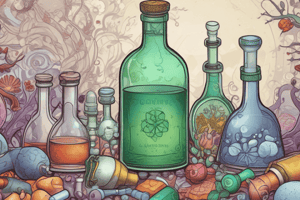Podcast
Questions and Answers
What is the definition of a toxicant?
What is the definition of a toxicant?
- Toxic substances that affect living organisms
- Toxic substances produced by human-made activities (correct)
- Toxic substances produced by biological systems
- Toxic substances that are naturally occurring
Which of the following is an example of a toxin?
Which of the following is an example of a toxin?
- Ricin (from castor beans) (correct)
- Carbon monoxide
- Lead
- Mercury
What is the primary focus of toxicology?
What is the primary focus of toxicology?
- Studying the effects of chemical agents on living organisms (correct)
- Studying the effects of biological agents on living organisms
- Studying the effects of physical agents on living organisms
- Studying the effects of genetic agents on living organisms
Which of the following is a key component of toxicology?
Which of the following is a key component of toxicology?
What distinguishes a toxin from a toxicant?
What distinguishes a toxin from a toxicant?
Flashcards are hidden until you start studying
Study Notes
Toxicology Fundamentals
- A toxicant is a chemical or agent that can cause harmful effects to living organisms.
- A toxin is a specific type of toxicant that is produced by living organisms, such as plants, animals, or microorganisms.
Focus of Toxicology
- The primary focus of toxicology is studying the adverse effects of chemicals on living organisms.
Key Components of Toxicology
- A key component of toxicology is understanding the dose-response relationship between a toxicant and the resulting harmful effects.
Toxin vs. Toxicant
- The key difference between a toxin and a toxicant is that a toxin is a naturally occurring substance, while a toxicant can be either naturally occurring or synthetic.
Studying That Suits You
Use AI to generate personalized quizzes and flashcards to suit your learning preferences.




